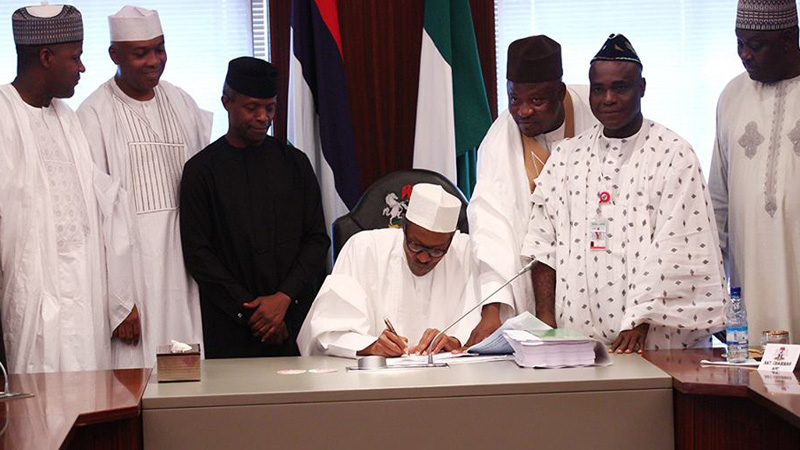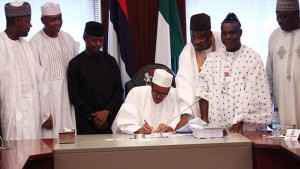It was a good feeling for most of us advocating for better and more spending in health sector to note that when Senator Udoma Udo Udoma the Hon. Minister, Budget & National Planning was highlighting major projects in 2016 Budget on Thursday, May 12, 2016 at the presidential villa he has talked about key health projects that would be executed. He mentioned in his PowerPoint presentation among other things that several programmes/projects are designed to significantly improve health indices across the nation, some of them are:
- 6 billion for vaccines, devices and operations programmes for Polio, Measles, and Yellow Fever etc.
- 3 billion counter-part contributions for procurement and distribution of antiretroviral drugs and contraceptive commodities.
In the signed 2016 budget, the overall provision for the 2016 budget is N6.06 trillion which represents an increase of N970 billion from the revised allocation of N5.09 trillion for 2015. Health sector got a total of N250.06 billion with a recurrent expenditure to be N221.412billion and ccapital expenditure to be N 28.650 billion, roughly the health sector budget is about 4.16% of the total budget.
Why did I said “it was a good feeling” in the beginning of my article? This is because from early December 2015 to the time the budget was signed by President Buhari, the civil society organizations and the media in Nigeria were consistently advocating for adequate allocation for immunization. These were done via many press conferences, online banners, seminars and reaching out to members of national assembly as well as many ministers face to face and via email and text messages.
An editorial in Health Reporters has captured succinctly the essence of our consistent call titled “Before Mr. President assents the 2016 Budget; commit to Routine Immunization” (https://healthreporters.info/2016/05/02/editorial-before-mr-president-assents-the-2016-budget-commit-to-routine-immunization/). It came out few days before the president signed the budget. It observed that “Nigerians are aware that in the initial budget that was passed by the national assembly 4 Billion Naira was slashed from funds allocated to Routine Immunization and Polio Eradication. In the 2016 budget presented by President Buhari in December 2015, about 8 Billion Naira was allocated for Routine Immunization and Polio Eradication and in what was returned to him 50% each of the allocation was slashed. We want to believe that the national assembly slashed these funds not intentionally to starve the health sector but because they might not be fully aware of significance of these allocation and the consequence of their actions.”
It also highlighted that with a GDP of about $510 billion in 2014, Nigeria has now become the biggest economy in Africa ahead of South Africa which has occupy the 1st position for a long time. Nigeria that has over the years being enjoying support from GAVI (Global Alliance for Vaccine ) to finance its Routine Immunization Programme which was reported to contribute significantly to reduction of under-five mortality rate. From 2017 by virtue of its ‘LMIC’ status, the country will commence transition process from GAVI support. GAVI transition is calculated at 15% increase in Nigeria co-financing in 2017, and linear increase in co-financing obligation between 2017 and 2021. In 2022, the full market price occurs, and Nigeria will pay the full cost of device and average freight for new vaccines. Having said that last year (2015) Nigeria couldn’t provide its counter funding, World Bank had to bail us out with a loan of $200 million. With the World Bank facility of $200m, Nigerian government had purchased enough vaccines that would last up to 3rd quarter of 2016, hence NPHCDA only allocated about N4 billion of the 2016 requirement that would be sufficient to cover the last and 4th quarter of 2016. If we didn’t have the surplus of the vaccines purchased with the World Bank loan, this year our requirement to purchase vaccines would have being 14.4 Billion Naira not N4 Billion Naira. The editorial concluded with a call to President Muhammad Buhari before signing the budget to cross check and ensure the committee has provided adequate allocation to Routine Immunization.
We are delighted that in the signed budget N12.6 billion for vaccines, devices and operations programmes for Polio, Measles, and Yellow Fever etc is allocated. This is commendable against the background of dwindling financial resources in the country. Allocating the budget for Immunization is just one battle won. The civil society organizations and media should proactively reach out to National Primary Health Care Development Agency to know the detail breakdown of the N12.6 billion and how the funds will be utilize. Also most importantly to support the agency to ensure timely release by the Ministry of Finance and support the agency for transparent spending and linking it with improved immunization coverage.
All comments to Dr Aminu Magashi Garba Coordinator Africa Health Budget Network & Publisher Health Reporters (healthweekly@yahoo.com)





